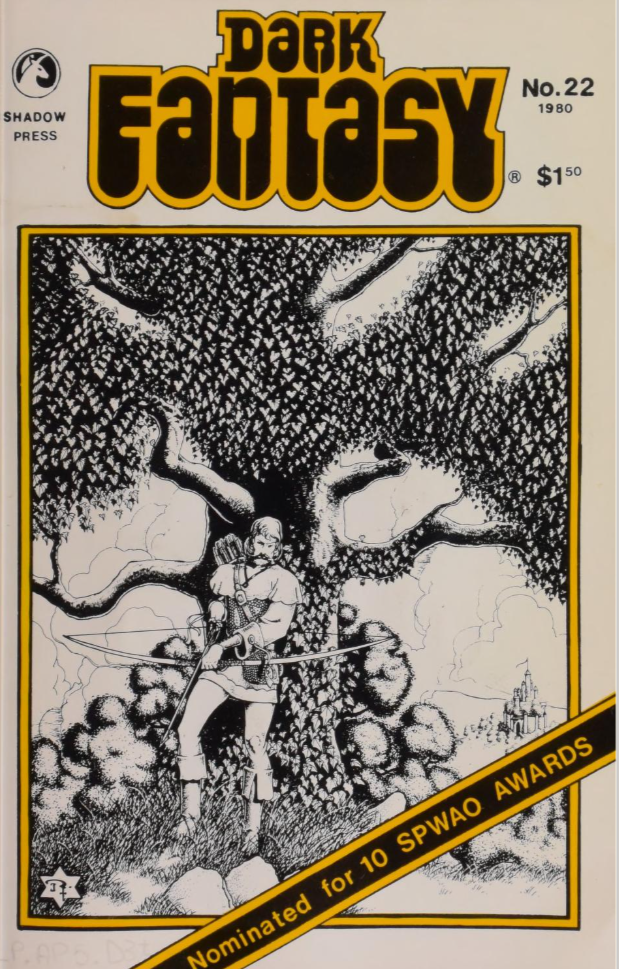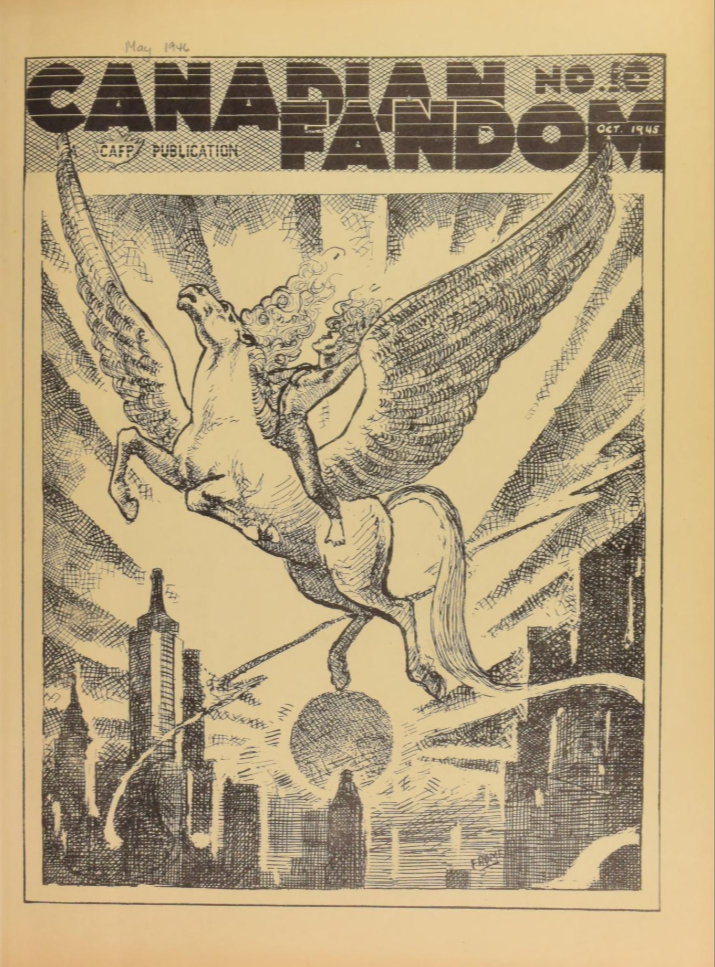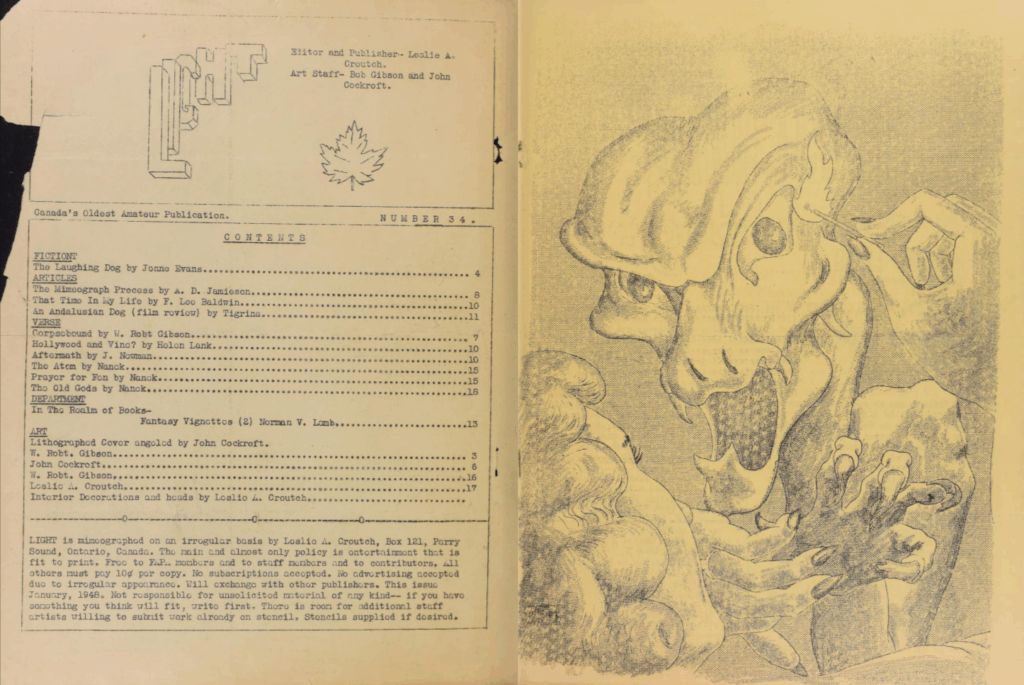Queen’s University Library has been collaborating with the Internet Archive on a digitization project that uses Controlled Digital Lending (CDL) to digitally loan items from our print collection using technological measures to ensure that the digital copy is only available to one user at a time while the physical copy is taken out of circulation.[1] Our project follows the example set by the University of Alberta, which successfully digitized a large collection of historical education textbooks and made them available using CDL in the Internet Archive.
The thirteen titles chosen for our project are periodicals with multiple authors. Most can be loosely classified as self-published, small print-run fanzines or zines within the science fiction/fantasy/speculative fiction genres. We chose these titles because they were published in Canada featuring predominantly Canadian authors; they are not widely available in library collections or on the antiquarian book market; and they presently reside within Rare Books and Special Collections at Queen’s University Library, a non-circulating collection.

While many or all of the stories contained within these items likely still fall within copyright, we felt that their commercial unavailability in print or digital formats, and unlikelihood of becoming commercially available due to their scarcity and relative age (issued between 1941 and 1980), made them prime candidates for sharing via CDL, maintaining the original expectations of the creators that one item owned would allow for only one item to be loaned at a time.

October 1945
All the titles are examples of Canadian content from the Norman V. Lamb Gothic Fantasy Collection at W.D. Jordan Rare Books and Special Collections. The bulk of this collection was originally collected by Norman V. Lamb, a civil servant, book collector, science fiction writer, and sergeant in the Canadian Army during World War II. The library acquired most of these items in 1967 from Jack’s Book Store in Toronto, and throughout the 1970s and early 1980s it was supplemented with additional titles under the guidance of English Literature professor, Charles Pullen.
The 13 titles are:
- 8-Ball (1943), later renamed Canadian Fandom, a fanzine published by Joseph “Beak” Taylor, a student at St. Andrew’s College for Boys in Aurora, Ontario.
- Canadian Fandom (1943-1955), a science fiction fanzine created and edited by Joseph “Beak” Taylor, and later Ed McKeon, Gerald Stewart, and Bill Grant in Toronto (originally called 8-Ball)
- Censored (1941-1951), a science fiction fanzine published by Fred Hurter, Jr., also a student at St. Andrew’s College for Boys in Aurora, Ontario.
- Croutch News (1941), later renamed Light, published by Leslie Croutch in Parry Sound, Ontario (see also Spectra, Tinker, and The Voice).
- Dark Fantasy (1973-1980), a bimonthly fantasy fiction zine published in Gananoque, Ontario by Gene Day under the imprint, Shadow Press.
- Light (1937-1963), Canada’s third science fiction fanzine, published by Leslie Croutch in Parry Sound, Ontario (originally called Croutch News) (see also: Spectra, Tinker, and The Voice).
- Mephisto (1942-1943), a short-lived sci-fi fanzine published by Alan Child in Vancouver.
- Science Fiction (1941-1942), a short-lived pulp magazine published by Superior Magazines in Toronto, edited by William Brown-Forbes.
- Spectra (1946), a single-issue fanzine published by Leslie Croutch in Parry Sound, Ontario (see also: Croutch News, Light, Tinker, and The Voice).
- Tinker (1947), the working draft of a short story by Leslie Croutch of Parry Sound, Ontario, presented to the collector, Norman V. Lamb (see also: Croutch News, Light, Spectra, and The Voice).
- Vanations (1952-1953), a fanzine published by Norman Browne in Edmonton.
- The Voice (1945-1946), also published by Leslie Croutch in Parry Sound, Ontario (see also: Croutch News, Light, Spectra, and Tinker).
- Vulcan (1942), a fanzine published by Gordon Peck in Vancouver.

Anyone with an Internet Archive account can borrow one of the 124 items currently in this digital collection. We hope that providing wider digital access to these publications will also have the effect of inspiring further research into the history of Canadian fandom, science fiction, and fantasy writing.
[1] More information about the legal and policy rationales for this process in Canada is available in the 2022 paper Controlled Digital Lending of Library Books in Canada.
Guest blog by: Graeme Campbell, Open Government Librarian, Brendan Edwards, Curator, Rare Books and Special Collections and Mark Swartz, Scholarly Publishing Librarian (Queen’s University)
